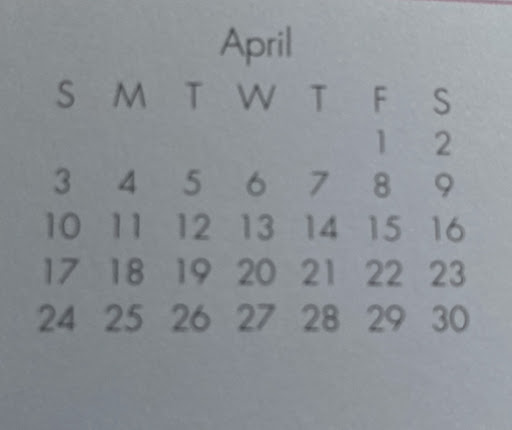School Board Announces Decision to End School Year Two Weeks Early

A look ahead at April this year.
April Fools! Whether you fell for that headline or not, it’s probably not the first time that you’ve encountered an April Fool’s Day joke. Every year on April 1, many of us revel in pulling pranks on our friends. It can be a very fun day or a very stressful day depending on who you are. But where did this tradition come from?
Possible origins of April Fool’s Day go all the way back to 1582 when France swapped the Julian Calendar with the Gregorian Calendar, causing the new year to begin on January 1 and not April 1. People who continued to celebrate the new year around April 1 became known as “April fools” and many jokes were often played on them. The origins of April Fool’s Day can also be traced back to ancient Rome where people would dress up at a festival called Hilaria in disguises and play games.
During the 1700s, April Fools Day grew more popular in countries like Britain, where they would celebrate the holiday by sending people on fake errands or putting “kick me” signs on others’ backs. By the 1900s, the appeal of the tradition had spread around the world.
Many news outlets began to play pranks on their readers on April Fool’s Day by announcing fake stories (such as in 1992 when the National Public Radio announced that Nixon was running for president again). One of the most famous April Fools pranks was in 1957 when the BBC informed the public that the spaghetti harvest was improving thanks to an early spring, which caused hundreds of viewers to call in asking to buy some spaghetti and how to grow it themselves. The response that they got was to “Place a sprig of spaghetti in a tin of tomato sauce and hope for the best.”
While April Fool’s Day is largely a day for fun, the notion that the day is filled with lies has caused people to be wary of what they hear and read on that day. So much so that the Treaty of Warsaw, which was an alliance between the Holy Roman Empire and Poland, was held on March 31,1683 instead of April 1 so no one would think that the treaty was fake.
On April 1, 2007, a python was accidentally released in a Google facility in New York City. When the company sent out an email warning the employees that the python was loose in the building, the employees paid it no attention since they thought that it was just an April Fool’s prank.
For hundreds of years now, people have been pulling pranks on each other on April 1. April Fool’s Day has become one of the most notorious “holidays” of the year, and in history. As the day inevitably comes around every year, we all have to stay vigilant and alert. So, watch out for any “kick me” signs on your back!







